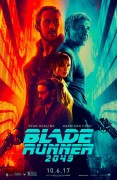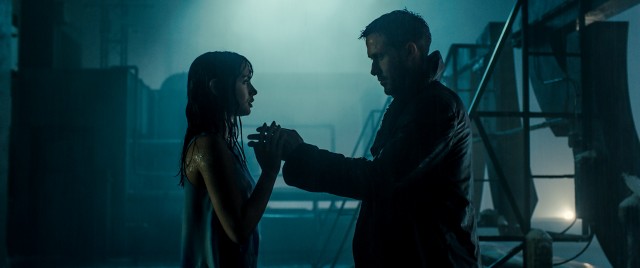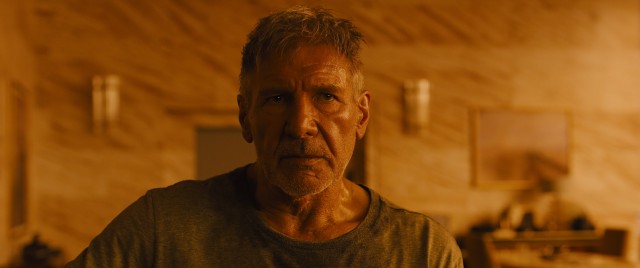Blade Runner 2049 Movie Review
 |
Blade Runner 2049
Theatrical Release: October 6, 2017 / Running Time: 169 Minutes / Rating: R Director: Denis Villeneuve / Writers: Hampton Fancher (story & screenplay); Michael Green (screenplay); Philip K. Dick (characters) Cast: Ryan Gosling (K/Joe), Harrison Ford (Rick Deckard), Ana de Armas (Joi), Sylvia Hoeks (Luv), Robin Wright (Lieutenant Joshi), Mackenzie Davis (Mariette), Carla Juri (Dr. Anna Stelline), Lennie James (Mister Cotton), Dave Bautista (Sapper Morton), Jared Leto (Niander Wallace), Edward James Olmos (Gaff), Sean Young (Rachael), Barkhad Abdi (Doc Badger), Wood Harris (Nandez), David Dastmalchian (Coco) |
Blade Runner 2049 marks the third time in the past ten years that a 1980s Harrison Ford film receives an untimely sequel. The last two were new entries to the lucrative, well-established Star Wars and Indiana Jones franchises. But in time, the original Blade Runner has evolved, first into a cult classic and then into just plain classic. It is now regarded as a benchmark of sci-fi, whichever of the seven different edits you're seeing it in. Still, Blade Runner, adapted from Philip K. Dick's 1968 novel Do Androids Dream of Electric Sheep?, is not a proven brand. And though he has twice recently returned to the Alien well after more than thirty years away, Scott only serves as executive producer here, enabling younger but already esteemed director Denis Villeneuve (Arrival, Sicario, Prisoners) to make the old new again and appeal to a new generation of moviegoers, whether or not they're familiar with the original movie.
Villeneuve takes the helm with a new screenplay by Hampton Fancher (screenwriter of the original film) and TV-seasoned up and comer Michael Green (Logan, "Heroes"). As the title indicates, this film is set in 2049, thirty years after the now nearly contemporary original movie. As in the predecessor, onscreen text establishes the universe where outlawed human-like replicants are hard to identify and "retire", though that is the job of Blade Runners such as our protagonist this time around: an officer named K (Ryan Gosling).
In an attention-grabbing opening scene, Officer K surprises a replicant (Guardians of the Galaxy's Dave Bautista) with a home visit, before subjecting him to an examination. A scuffle ensues and we see the dangers of being a Blade Runner. K is not loved by others, but he is respected by his superior (Robin Wright) for the efficiency with which he carries out his job. K himself is a replicant. Or is he? That is left ambiguous, just as it was with Harrison Ford's Blade Runner Rick Deckard.
Once again, the setting is a sight to behold. 2049 Los Angeles is often dark, yet full of bright lights and commercial enterprises. Whereas in the first film, L.A. was gripped by rain, here it is snow that features prominently. Atmosphere is again a critical element and, no surprise given his previous films, Villeneuve excels at serving it up.
The original film received complaints regarding its pace back in 1982. Villeneuve seems to welcome similar criticisms here. Whereas in all seven of its incarnations, the original film ran just under two hours, this follow-up runs 2 hours and 49 minutes. It feels that long too. 2049 is epic and methodical. Where other new movies struggle to find room to squeeze in dialogue and take a breath amidst action set pieces and effects, 2049 is content to just slowly revel in the scenery, of a futuristic apartment or the low/high-tech archives of Niander Wallace (Jared Leto), a businessman who flourished on synthetic farming who has acquired the replicant-manufacturing Tyrell Corporation.
Most of the movie finds Officer K looking into an old mystery involving a replicant who has unprecedently given birth. This mission takes him all over the place, including a memory manufacturer and, eventually, the lush pad where Deckard has been hiding and growing old.
In pre and post-screening announcements, Villeneuve requested that plot points not be revealed, down to a couple of cameos that the cast list above nonetheless reveals. I'm happy to oblige. After all, Thirty-five years is an eon in Hollywood, where styles dramatically change every few years. Twenty-five years had passed between The Hustler and The Color of Money and that seemed extreme. With Ford having revived Indy and Han Solo after nineteen and thirty-two years, respectively, this endeavor isn't quite as unprecedented as it could be. At 75, Ford clearly is still interested in acting and these recent high-profile efforts have made good use of him instead of just preying upon childhood nostalgia.
But Ford doesn't show up until the final hour here. The show belongs to Gosling and he is superb returning to his laconic Drive mode after charismatic turns in last year's delightful La La Land and The Nice Guys. As Officer K, later named Joe, Gosling won't sniff any nominations outside the Saturn Awards. But he's an appealing leading man who is easy to watch for two plus hours as the film lingers on him just slowly moving about.
There's a near-masterpiece in 2049 if you cut out some of the excess. Not everyone will agree what does and doesn't work. For instance, Leto's villain is even more on the fringe than his Joker was in Suicide Squad and really seems to exist only to deliver one climactic gut punch. After the opening sequence, in which Bautista's farmer gets to briefly evoke Roy Batty's "tears in rain" monologue, there is less of the Replicant presence than there was last time. Maybe that's a good thing, since Villeneuve and company clearly were making a sequel, not a remake, which was perhaps the biggest complaint lobbied against The Force Awakens. There's no need to just regurgitate.
While that Star Wars movie predictably shattered box office records, how Blade Runner performs is anyone's guess. The director's three previous English language movies have all met or exceeded commercial expectations. But this is a more challenging presentation than any of those. It's also a pricier and riskier one, with a $185 million budget putting this at about the same cost as Marvel's surefire superhero extravaganzas. The reputation that the original film has developed over the years will reel viewers in, as will the promise of Gosling and Ford as the two leads, which isn't really accurate, but who cares? Will the long, laborious experience hurt word of mouth and repeat business, even if critics are almost universally approving? I think so.
But this isn't intended to revive a franchise or launch a cinematic universe. The goal here is to create a dynamic standalone film that works if you haven't seen the original but works even better if you have. Not surprisingly, given the talent assembled here, that goal has been achieved. Blade Runner 2049 probably won't compete for major honors, but it seems destined to at least vie for technical awards and quite possibly win some, with its phenomenal production design by Dennis Gassner and often breathtaking compositions by oft-nominated, never-awarded Coen brothers cinematographer Roger Deakins, who should pick up his third consecutive nomination for a Villeneuve film here.
|
Related Reviews:
DVDizzy.com | DVD and Blu-ray Reviews | New and Upcoming DVD & Blu-ray Schedule | Upcoming Cover Art | Search This Site
DVDizzy.com Top Stories:
Directed by Denis Villeneuve: Arrival • Sicario • Prisoners
Ryan Gosling: Drive • The Nice Guys • La La Land • Only God Forgives • Gangster Squad
Harrison Ford: Star Wars: The Force Awakens • Indiana Jones: The Complete Adventures • 42 | Jared Leto: Suicide Squad • Dallas Buyers Club
Robin Wright: Wonder Woman • The Princess Bride | Ana De Armas: War Dogs • Hands of Stone
Ex Machina • Terminator Genisys • Mad Max: Fury Road • Tron: Legacy
Now in Theaters: Wind River • American Made • Kingsman: The Golden Circle • It • Battle of the Sexes • mother!
Text copyright 2017 DVDizzy.com. Images copyright 2017 Warner Bros. Pictures, Alcon Media Group, Columbia Pictures, Alcon Entertaiment, Torridon Films, and 16:14 Entertainment.
Unauthorized reproduction prohibited.

